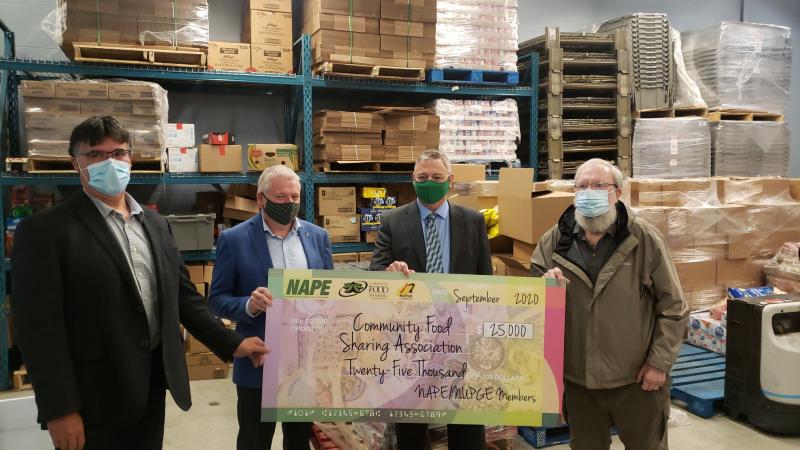This is an archive of news stories and research from the National Union of Public and General Employees. Please see our new site - https://nupge.ca - for the most current information.
While we work towards policies that address the root causes of food insecurity and end inequality once and for all, NUPGE is happy to support the work CFSA does to support the people of Newfoundland and Labrador.
Ottawa (28 Sept. 2020) — The National Union of Public and General Employees (NUPGE) are pleased to announce that a joint donation with Newfoundland & Labrador Association of Public and Private Employees (NAPE) of $25,000 has been made to The Community Food Sharing Association (CFSA). CFSA is the pivotal agency for food distribution to the hungry in Newfoundland and Labrador. The charity manages the collection and distribution of food through 54 food banks to more than 11,000 people across the province. NUPGE Secretary Treasurer Bert Blundon presented the cheque on September 24.

Low income earners hit harder by pandemic
Back in April, NUPGE wrote a paper called COVID-19 and Income Inequality. Though COVID-19 was being described as being the great equalizer, it was clear to us early on that this was simply not true. Low income workers (who are predominantly BIPOC workers, women workers, and/or workers from other equity seeking groups) were hit harder than other workers in several ways.
Many low paying jobs (grocery store clerks, custodians, long-term care workers, homecare workers, agricultural workers, etc.) are of vital importance to society, but are paid so low that many workers are forced to take on second or even third jobs to earn the equivalent of a full time salary. The annual BDO Canada Affordability Index found that, in 2019, over half (53%) of Canadians are living paycheque to paycheque, and 27% don’t have enough for their daily needs. Most low paying jobs don't come with paid health benefits or paid sick leave. Working multiple jobs increases the likelihood of exposure to COVID-19, and failing to provide paid sick leave gives workers no other choice but to go to work when sick.
Hoarding essential items hurts the most vulnerable members of our society
The work CFSA does became even more important during the pandemic. As workers were laid off and forced onto EI or CERB, more individuals and families had to access foodbanks. This need was compounded by the waves of panic buying and hoarding that occurred in the Spring. Though the disruption to global supply lines was alarming, more alarming were the images of shoppers exiting grocery stores with carts overflowing with toilet paper. Low income workers cannot afford to buy in bulk quantities, nor can they afford inflation on essential items. CTV News reports that the inflation rate could rise as high as 4 per cent by the time the pandemic is over. Panic buying also negatively impacts people with disabilities: when faced with empty store shelves, they can’t buy essential items like sanitizer and wipes that they rely on in their daily lives. It's also harder for low income workers (who work multiple jobs and have limited free time) and people with disabilities to line up early to ensure they can buy essential items when stores open for the day.
Systematic racism and sexism are linked to food insecurity
It's important to note food insecurity does not impact all low wage workers equally. PROOF Food Insecurity Policy Research found that in 2017-2018, the highest rates of food insecurity were reported by people who identified as Indigenous or Black. They also found that households led by single female parents are especially vulnerable to food insecurity. This is likely due to the combination of policies, programs, and structures that discriminate against Black people, Indigenous people, and women. The high cost of childcare prevents many women from working full-time jobs. High shipping costs make food unaffordable in rural areas, particularly for Indigenous communities in northern Canada. Black people are more likely to have lower incomes, and are more likely to live in low-income areas where food deserts are more likely to exist.
Melana Roberts, chair of Food Secure Canada's Board of Directors, wrote that even after adjusting for factors like immigration status, education level, and homeownership, "Black communities are 3.5 times more likely to experience food insecurity compared to white Canadians...Black children were also 34 percent more likely to be food insecure compared to 10 percent of white children. This disparity has been linked to the increased likelihood of developing chronic diseases, like diabetes, asthma, and depression, and to poor educational and health outcomes, like learning challenges, low graduation rates and low self-esteem."
In a fact sheet published in partnership with FoodShare, PROOF also found that "Owning rather than renting one’s home protects against food insecurity. But the benefits of homeownership differ by race. White renters and Black homeowners have the same risk of household food insecurity, suggesting that Black homeowners may have other financial burdens such as mortgage and/or their homes are worth less."
NUPGE will continue to fight against food insecurity on all fronts
Having national child care, pharmacare, and paid sick leave for all would go a long way in helping the most vulnerable members of our society. While we work towards policies that address the root causes of food insecurity and end inequality once and for all, NUPGE is happy to support the work CFSA does to support the people of Newfoundland and Labrador.
